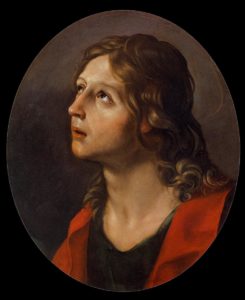Thoughts on Sunday’s Lessons for Dec. 31, 2017

Saint John the Evangelist, oil painting by Simone Cantarini (Pesarese), (1612–1648). Private collection in São Paulo, Brazil. (Click image to enlarge.)
Christmas has come, joy fills the world, and the Word that was present at the beginning now brings us the light of God and dwells among us. Our first reading from Isaiah rings out the joy and exultation that mark the end of the people’s exile in Babylon and their return to Jerusalem. They go beyond triumphant celebration, though, to hope for the future, hope that God will restore the city and the temple as a light of the world. It will be a new Zion, one that springs up like a garden to show God’s righteousness and justice.
One of the six resounding hymns of joy that conclude the 150 Psalms, this memorable anthem begins and ends with a mighty “Alleluia,” a shout of exultation we can translate literally from the ancient Hebrew as “Praise the Lord!” We praise the Lord who is near, who heals our hearts and binds our wounds. We also praise the mighty far-off God of all creation, Lord of stars and clouds, winds and waters, rain and the growing grass and all the animals and all of us, too. Praise the Lord!
Second Reading: Galatians 3:23-25; 4:4-7
Our faith opens for us a world of grace and joy, Paul tells the Christians of Galatia, a group of Gentile churches in central Turkey. These words of Paul were strongly influential on Martin Luther, who relied on these and similar passages in Romans and Hebrews to work out his “sola fide” theology of faith and works. In beautiful, hope-giving verses, this passage tells us of God’s Christmas gift to all humankind: We are claimed as adopted children and heirs of God through our sisterhood and brotherhood with Jesus.
Gospel: John 1:1-18
These words that open John’s Gospel are so familiar that we may feel we know them by heart. But it’s worth closer attention to discern the fullness of their meaning. The book begins with the same words that begin the Bible in Genesis: “In the beginning.” This is no coincidence. John wants us to know that the same Word of God that brought the world into being now comes as Jesus to bring us the light through which we can see God. Fully human now, but always fully divine, the Word was with God from the beginning, and now lives among us. John the Baptist was sent ahead as witness to tell the world this wonderful news.
